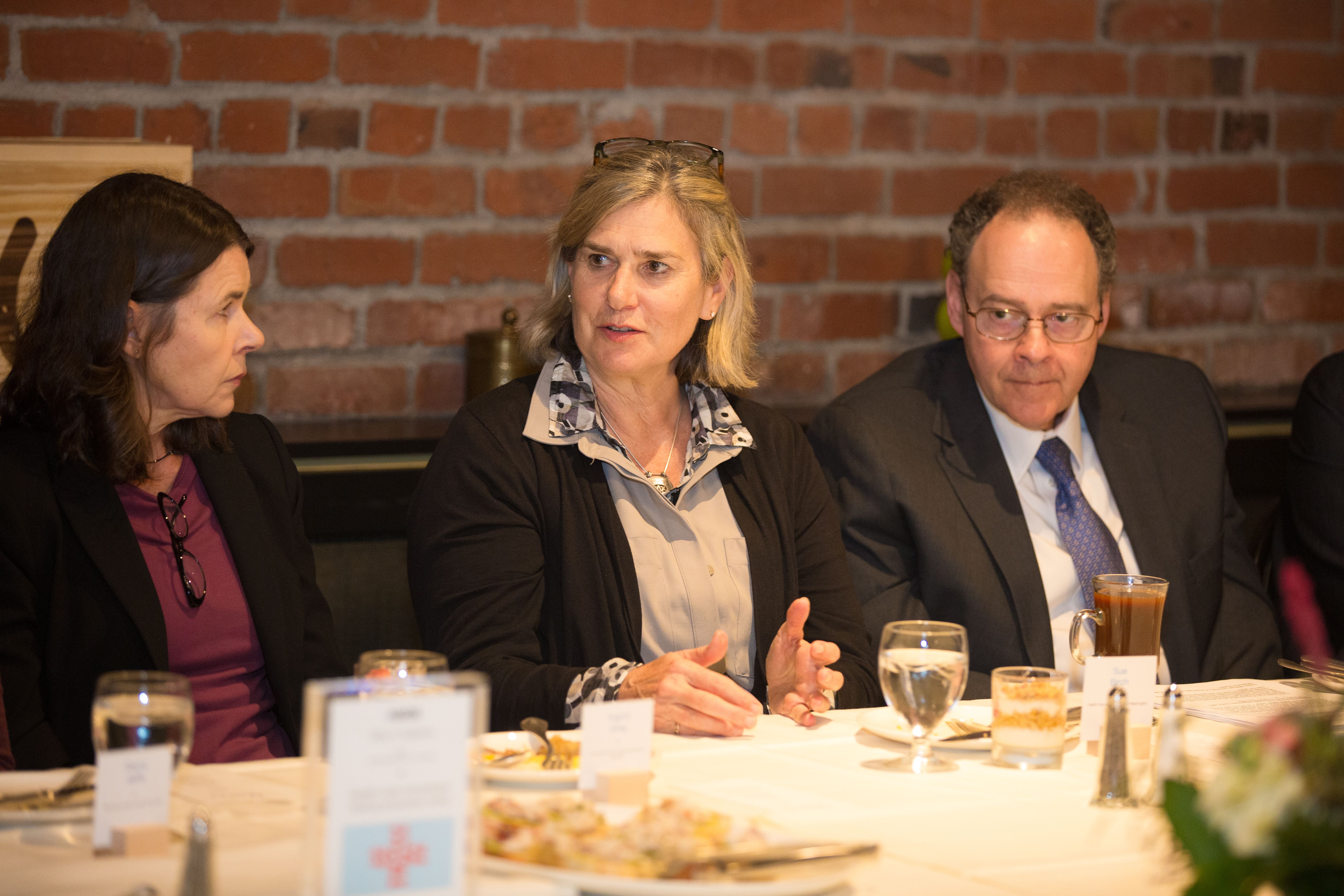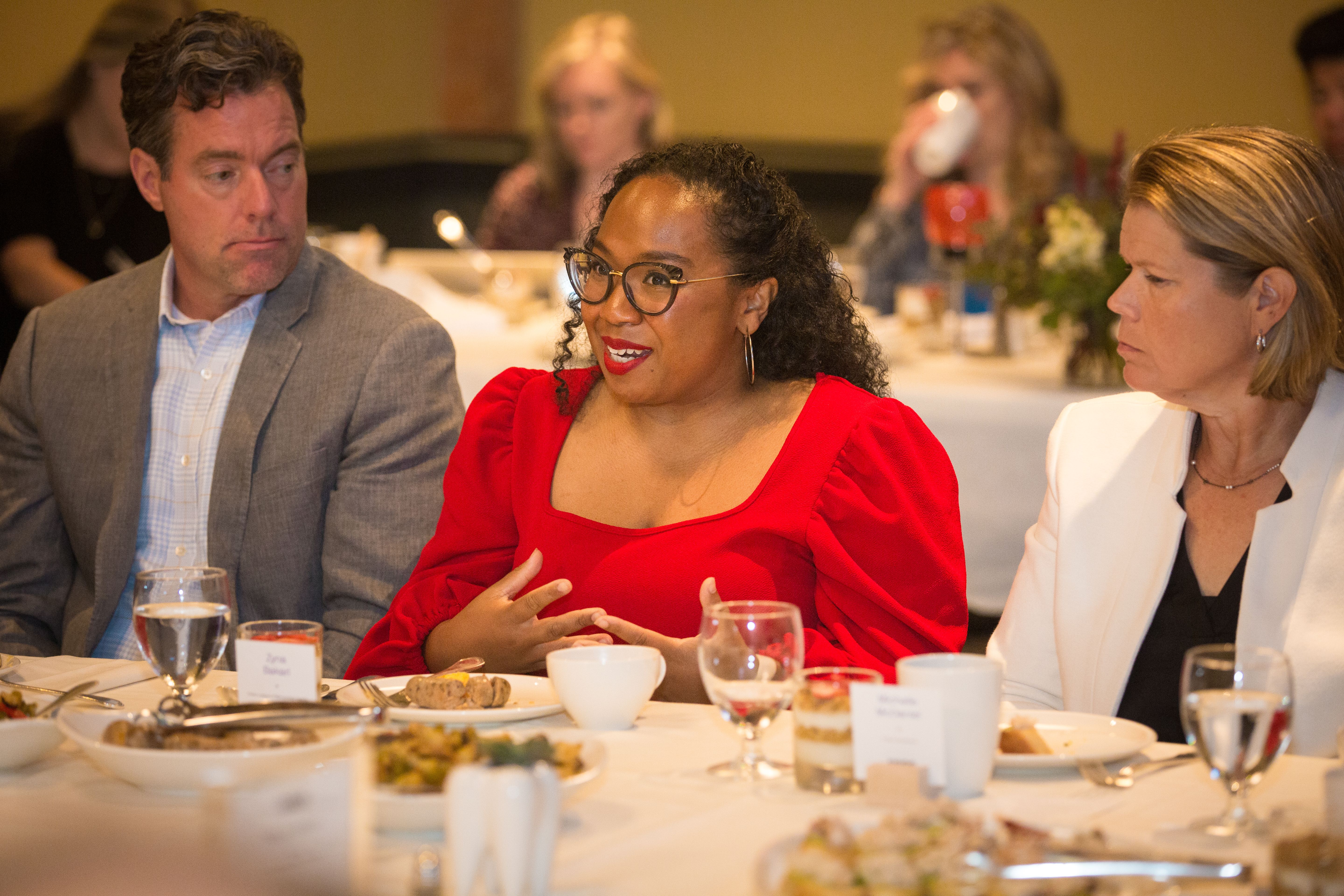Health Care Vitals: Seattle
On Wednesday, October 12, Axios hosted an Expert Voices roundtable discussion in Seattle, Washington featuring local health care leaders, policymakers and medical experts. Guests offered their perspectives on combating barriers to health care access and proposed solutions for bridging equity gaps. Axios’s senior health care editor Adriel Bettelheim led the conversation.
On the looming end of the COVID-19 public health emergency
Washington state officials spoke about preparing for the end of the pandemic-era public health emergency and ensuring the people of Washington are able to remain insured and receive health care coverage when it ends.

Washington State Health Care Authority director Sue Birch speaking to fellow attendees. Credit: Nityia Photography
- Washington State Representative Nicole Macri: “One thing that we have been working on over the last few years is the Cascade Care Program, known as the first in the nation public option on our individual market. And this last couple of legislative sessions, we made improvements to Cascade Care…and one of the things that we have been working towards is really deepening the subsidies that the federal government has put forward. So we had a lot of handwringing that the end of the public health emergency also would coincide with the end of these enhanced public subsidies from the federal government for folks on the individual market, and we were thrilled when the Inflation Reduction Act passed and was signed into law and extended those.”
- Ingrid Ulrey, U.S. Department of Health and Human Services region director: “We do expect this extension, and the Center for Medicare and Medicaid Services, CMS, is working closely with state officials and has issued detailed guidance to ensure that we don’t lose people through the region termination process, that we ensure that people who are still eligible for Medicaid remain on Medicaid…it is incredibly important that Congress extended those subsidies, that is going to be the major thing that will mitigate the loss of coverage during this inflection point.”
- Director of the Washington State Health Care Authority Sue Birch: “There have been extensive collaboration meetings going on about the PHE unwind…we know that 3 to 400,000 folks are going to be disrupted. This is a bigger hit than when we started ACA. So we’ve had to gear up call centers, technology system processes, communications, we’ve got a lot going on in this area because Washington is a state that we want more people covered…we want to be one of the first states that continues to brag up the greatest coverage penetration. We just simply can’t ever relax on coverage and access.”
On partnerships that take into account specific community needs and social determinants of health
Attendees expressed the importance of partnerships between government, community-based organizations and local health jurisdictions that focus on health access and equity.

Zyna Bakari, public health program manager at the Urban League of Metropolitan Seattle, speaking to the Axios roundtable group. Credit: Nityia Photography
- Zyna Bakari, public health program manager at the Urban League of Metropolitan Seattle: “I guess what I’m trying to highlight here is how important it is to support community-based organizations to build capacity to start up health navigation programs…we’re able to keep a lot of people where they are because our navigators who are out at encampments every single day helping folks who are experiencing homelessness get the resources that they need.”
- President and CEO of Delta Dental Washington Mark Mitchke: “I think a really great example of the partnership that we’ve had success with in Washington state is the Access to Baby and Child Dentistry program…the ABCD program has been in place for about 20 years, and it’s really a partnership between Arcora, Delta Dental of Washington, the Health Care Authority, local community dentists, and communities across the state that’s improved access to dental care for Medicaid children in our state by about 50% over the course of 15 years.”
- Senior deputy director at the University of Washington Center for Health Workforce Studies Susan Skillman: “It’s so important when we think about workforce to understand that access to health care and the workforce that provides it is very dependent on the insurance and the coverage that people have…whether someone goes to a primary care office and is diagnosed or recognized to have a behavioral health issue, what kind of insurance they have will determine whether there’s any care coordination to help them get to a referral.”
- Emily Bancroft, president of VillageReach: “I think one of the challenges that we’ve seen in the work that we’ve been doing with local health jurisdictions is sometimes this disconnect of how to utilize them in terms of reaching those most underreached, really getting into the communities, doing more linkage with community service organizations to make sure that we’re making these connections between what’s happening on a policy level, and this inflection point, and then what the local health jurisdictions could do…”
Thank you Delta Dental Institute for sponsoring this event.
Read the original article here: https://www.axios.com/2022/10/17/health-care-vitals-seattle